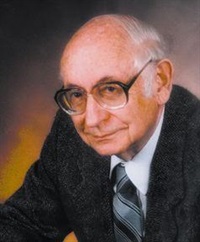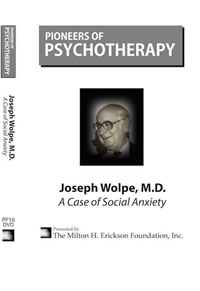Joseph Wolpe, MD - A Case of Social Anxiety, 12/10/1985, Video Stream More info »
Joseph Wolpe, MD - A Case of Social Anxiety
- Average Rating:
- Not yet rated
- Topic Areas:
- Clinical Demonstrations | Anxiety | Psychotherapy
- Categories:
- Pioneers of Psychotherapy | Evolution of Psychotherapy | Evolution of Psychotherapy 1985
- Faculty:
- Joseph Wolpe, M.D.
- Course Levels:
- Master Degree or Higher in Health-Related Field
- Duration:
- 00:57:00
- Copyright:
-
Dec 10, 1985
- Publisher:
- The Milton H. Erickson Foundation Press
- License:
- Never Expires.
Tags: Anxiety Psychotherapy
Description
Description:
Joseph Wolpe (1985) begins with Santiago who has a history of experiencing strong feelings of anxiety and discomfort during social situations. Questioning reveals that these problems are most intense when he is in situations in which he experiences a loss of control. Wolpe uses imagery and desensitization to diminish feelings of anxiety.
From conference EP85-CD04-DVD
Educational Objectives:
- To demonstrate accuracy in behavior analysis.
- To apply behavior techniques.
*Sessions may be edited for content and to preserve confidentiality*
Credits
Faculty

Joseph Wolpe, M.D. Related Seminars and Products
Joseph Wolpe, MD, was a South African psychiatrist, one of the most influential figures in Behavior Therapy. Wolpe grew up in South Africa, attending Parktown Boys' High School. Joseph received his M.D. in 1948 from the University of Whitatersrand in Johannesburg, South Africa. He was Emeritus Professor fo Psychiatry and Former Director of Behavior Therapy Unity at Temple University Medical School. He was Professor of Psychiatry at the Medical College of Pennsylvania. One of the leading practitioners of behavior therapy, he has authored three books and co-edited two, and has more than 200 professional publications. He cofounded the Journal of Behavior Therapy and Experimental Psychiatry. He is receipient of the Distinguished Scientific Award for the Applications of Psychology from the American Psychological Association.


